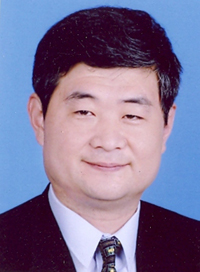 Zhang Chang’an
Zhang Chang’an | Academic Title: professor | |
| Academic Degree: Ph. D(Japanese Hirosaki University) | |
| Affiliation: Department of Japanese, the School of International Studies | |
| E-mail Address: zca65@163.com | |
| Research Areas: Japanese society and culture, translation practice | |
| Major Courses Taught: Japanese Culture, Translation, Comprehensive Japanese, Japanese Writing |
Major Publications: Special Japanese for job hunters: A guide,Xi’an Jiaotong University Press, April 2008 (Zhang Chang’an, Sun Li, Shen Lifang, Wang Jing, Lu Lei) -----------------------------------------------------------------------------------------------------  Bio Ethics, Northwest University Press, August 2001 (Yasuhiko Igarashi, Translated by Zhang Chang’an) ----------------------------------------------------------------------------------------------------- Medical treatment and nursing, Chinese Medical Ethics 2000 Vol.3 (Gen. 71) (Yasuhiko Igarashi, Translated by Zhang Chang’an) ----------------------------------------------------------------------------------------------------- The ethical thinking about medicalizing society Chinese Medical Ethics 2002 Vol. 3(Gen. 83) (Yasuhiko Igarashi, Translated by Zhang Chang’an) ----------------------------------------------------------------------------------------------------- Idea of Japanese declining birthrate and a growing proportion of elderly people Chinese Medical Ethics 2002Vol.4(Gen. 84) (Zhang Chang’an) ----------------------------------------------------------------------------------------------------- Introduction to Japanese Medicine and Philosophy Ethics Institute Chinese Medical Ethics 2003 Feb.1(Gen.87) (Zhang Chang’an) ----------------------------------------------------------------------------------------------------- The consciousness of medical ethics from Japanese Chinese Medical Ethics 2004 Feb.1(Gen. 93) (Zhang Chang’an) ----------------------------------------------------------------------------------------------------- An Introduction of Chinese Traditional Culture into Hospice Programme in China, The Journal of Philosophical Studies XXXX,March 2006 (P1-20) (Zhang Chang’an) ----------------------------------------------------------------------------------------------------- J.Health Cara,Med.﹠Community,No.21,June,2002(P31-34) Abstract. We should put forward the conception for health intelligence quotient clearly. The definition is that health intelligence quotient reflects individuals or residents living in a region level of possessed health consciousness, health knowledge and health ability. The standard of intelligence quotient can be defined as the ratio between the summation of possessed health consciousness, health knowledge, health ability and the summation of deserved health consciousness, health knowledge, health ability. The formula is usually described by HQ=HKAP/HKOP. The author believes that intelligence quotient is very important to the health of human being. The ways how to improve health quotient also are discussed.(Li Enchang,Translated by Zhang Chang’an) ----------------------------------------------------------------------------------------------------- J.Health Cara,Med.﹠Community,No.25,June,2004(P51-55) Consideration on Developing of Hospice Programme in China Abstract. In order to enhance a quality of life and death, it is necessary to get to grips with the problems concerning terminal care. That is an urgent task, particularly in China whose population is the largest in the world. In this paper, I would like to consider how to develop Hospice Programme in China. The essence of Hospice Movement, I think, is the social education of death, so the professionals of Hospice Programme have to learn not only the knowledge and faculty of medical science and technology, but also the wisdom of cultural and social science. In China, where materialists are the majority, most people do not believe in the existence of spirit. But the history of Hospice Movement teaches us that the most important service in Hospice is not the use of medical technology but the healing the spiritual sufferings of patients by means of philosophical and religious wisdom. So, we should recognize the existence of spirit and introduce the resources of traditional culture into Hospice Programme in China. (Zhang Chang’an) ----------------------------------------------------------------------------------------------------- J.Health Cara,Med.﹠Community,No.28,June,2006(P70-82) Abstract. After the excavation and systematization of Confucianism, Taoism and Buddhism, this paper thinks that it is very necessary to perceive the thinking of the Chinese traditional philosophy and hospice of religion. It discourses upon the significance of practicing the traditional culture in the hospice career flexibly. (Zhang Chang’an) |

 (创新港)
(创新港)


